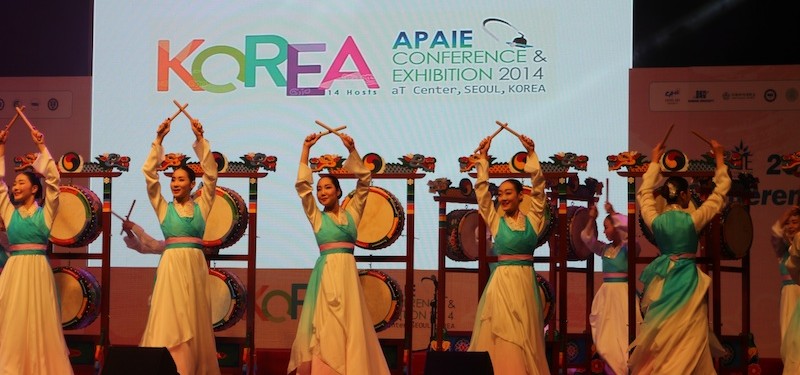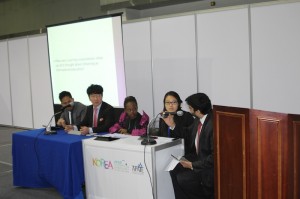Celebrating 10 years of focus on international education within Asia pacific, the Asia Pacific Association for International Education (APAIE) held its annual conference this week in Seoul and high on the event’s agenda were linkages between institutions and industry, establishing equal partnerships with emerging markets and harnessing the growing demand from interregional mobility.
News and business analysis for Professionals in International Education
Have some pie!
APAIE marks 10 years of Asia’s rise, partners with i-graduate

Over 1,300 participants from 600 countries attended with Korea, the USA and Japan dominating the delegate list. Underlining the region’s efforts to compete on a global scale, seven leading Asia Pacific institutions signed on with industry market research firm i-graduate to launch a three month pilot study to measure the impact of exchange programmes on skills development, career outcomes, global citizenship and personal development.
“Now Asian universities realise that, in fact, they can promote their culture their culture to the world”
Outgoing APAIE president Gordon Cheung commented that while Asian institutions may have arrived late to the international education game, they’re quickly catching up on their own terms.
“I think there were a lot of worries, talking about internationalisation, that they would lose their own culture,” he said. “Now they realise that that’s not the case; in fact, they can promote their culture. They can promote their culture to the world.”
Fourteen institutions across Korea organised the event led by host institution Chung-Ang University in Seoul. Vice President for International Affairs Jun Hyun Hong said that as Korean companies become more globalised, there is a demand for internationally minded foreign and domestic students in the country. “There are more job opportunities outside of Korea, even within Korean companies,” he noted.
“Traffic inside the region is growing but traffic across the continents are growing too. Even the destination is changing for Korean students going abroad. Previously most students preferred the US but now it’s Europe because there’s more diversity.”
China continues to be the largest source for international students at institutions in the region, noted heads of Korean universities. However, with 2,391,000 international students on the mainland, China’s profile as a study destination is growing.
Representatives from Renim University of China, Peking University and Sun Yat-Sen University in Guangdong said most of the foreign student populations at their universities come from Korea, Japan and other South East Asian countries but they are actively looking to increase the number of students from the US and Europe.

Chaired by the past president of the Council of International Students Australia, Aleem Nizari, a panel of international students gave first-hand accounts of the challenges and benefits of foreign study L-R Thomson Ch’ng, Sung-Kyu Lee, Angela Nijeri Waihumbu, Michelle Ga-yun Lee
Adding a new dimension to discussions in the sector, for the first time the voice of the international student was represented at the event by a panel of students from the USA, Kenya, Korea and Malaysia.
Overcoming language barriers and budgeting were among the shared challenges they faced but all agreed that the “international experience” was worth the cost of higher tuition fees and living away from their families.
At the closing Global Dialogue heads of international education organisations from the USA, Europe, Australia, South Africa and Asia discussed how to create equal university partnerships and industry ready graduates.
For the first time the voice of the international student was represented at the event by a panel of students from the USA, Kenya, Korea and Malaysia
“The goal of university relationships should be equal,” noted Nico Jooste, incoming president of the International Education Association of South Africa. “How do we create reciprocity in an unequal environment?” he asked.
APAIE member institutions Waseda University, Korea University, Hanyung University, Chinese University of Hong Kong, Griffith University, University of Auckland and Singapore Management University also announced their collaboration with i-graduate in a bid to further measure the outcomes of their mobility programmes and graduate employment.
The pilot study is set to run until June 2014.
“There is an assumption that study abroad is a positive, life-changing experience. There is, however, little data to back this up,” said Guy Perring, i-graduate Regional Director, Asia. “This collaboration between i-graduate and APAIE is the first step in a verifiable understanding of the value of student exchange.”
Next year’s conference will be hosted by Peking University in China under the leadership of APAIE’s newly appointed president Uchida Katsuichi of Waseda University in Japan.
Still looking? Find by category:



5 Responses to APAIE marks 10 years of Asia’s rise, partners with i-graduate